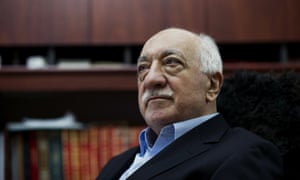Cleric who leads global Hizmet movement from exile in Pennyslvania, US, is a critic of Recep Tayyip Erdoğan and remains influential in Turkish affairs.

Fethullah Gülen in a 2014 photograph taken at his residence in Saylorsburg, Pennsylvania.
Photograph: Selahattin Sevi/AP
“We have consistently denounced military interventions in domestic politics. These are core values of Hizmet participants. We condemn any military intervention in domestic politics of Turkey.”“For more than 40 years, Fethullah Gülen and Hizmet participants have advocated for, and demonstrated their commitment to, peace and democracy.

Fethullah Gülen in a 2014 photograph taken at his residence in Saylorsburg, Pennsylvania.
Photograph: Selahattin Sevi/AP
The accusation by Turkey’s president, Recep Tayyip Erdoğan, that US-based cleric Fethullah Gülen is behind Friday night’s attempted coup is part of a familiar rhetoric and a long-running rivalry. So is there any truth in it?
It is probably worth pointing out in the first instance that the traditional rivalry in Turkish society has been between secularists (including those in the army) who look to the modern state’s founder, Kemal Atatürk, and Islamists – not least Erdogan’s AKP party.
The AKP has itself provoked a number of coups or attempts in Turkish history. And in many respects, Friday night looked to be another event in that tradition: a military coup driven from within Turkey’s armed forces. By Saturday morning Erdoğan had reasserted power and it was announced dozens of senior colonels and generals had been removed.
The military has long seen itself as the guardian of modern Turkey, and the movement lead by Gülen occupies a sort of murky gap between the two sides, secularist and Islamist.
Gülen, a cleric living in reclusive exile in Pennsylvania, leads a popular movement called Hizmet. It is a hodge-podge that at times has appeared cultish – spawning thinktanks, businesses, schools and publications across the globe, while building up substantial wealth and influence in the process.
According to some reports, 10% of the Turkish population is estimated to support Hizmet.
The centre of growing tension in recent years between the Gülenists, Erdoğan and the AKP has been Erdoğan’s blaming of Gülenists in the police and judiciary for anti-corruption allegations in 2013 that targeted senior supporters of the president, including his son Bilal.
The allegations were seen as retaliation for Erdoğan’s moves against Gülenist schools as the president attempted to limit the growth of the movement (an effort that had also seen Erdoğan invite Gülen to return from exile to Turkey).
The rivalry culminated in a purge of perceived Gülenists including senior army and police officers, as well as those in the media accused of Gülenist links.
As the coup attempt unfolded on Friday night, a lawyer for the Turkish government, Robert Amsterdam, said there were “indications of direct involvement” of the Gülenists, adding that he and his firm had “attempted repeatedly to warn the US government of the threat posed” by Gülen and his movement. Amsterdam cited Turkish intelligence sources in claiming that “there are signs that Gülen is working closely with certain members of military leadership against the elected civilian government”.
The Alliance for Shared Values, the US arm of Gülen’s Hizmet movement, was quick to deny any involvement in the coup, calling such claims “highly irresponsible” and insisting that the group did not support the military intervention.
“Events on the ground are moving quickly and it would be irresponsible for us to speculate on them,” the group said in a statement. “We remain concerned about the safety and security of Turkish citizens and those in Turkey right now.
“We have consistently denounced military interventions in domestic politics. These are core values of Hizmet participants. We condemn any military intervention in domestic politics of Turkey.”“For more than 40 years, Fethullah Gülen and Hizmet participants have advocated for, and demonstrated their commitment to, peace and democracy.
So what is the truth? Critics point to a video that emerged in 1999 in which Gülen seemed to suggest that his followers should infiltrate mainstream institutions.
“You must move within the arteries of the system, without anyone noticing your existence, until you reach all the power centres … You must wait until such time as you have got all the state power, until you have brought to your side all the power of the constitutional institution in Turkey.”
Gülen claimed, though, that the recording had been altered.
Speaking to France 24 in the midst of the 2013 tensions between Erdoğan and Gülen, Dorothée Schmid, a Turkey analyst at the French Institute of International Relations (IFRI), summed up the contradictions in the feud.
“Turkish democracy is in danger if we’re counting on a movement without any transparency or political legitimacy, when it comes to contesting the authoritarian tendencies of the power in place,” said Schmid.
On Friday night – thousands of miles away from the upheaval in Turkey – all was quiet outside the gated complex in sleepy Saylorsburg, the small Pennsylvania town where Fethullah Gülen resides in his sprawling Golden Generation Worship and Retreat Center.
Security guards refused access to the complex and said Gülen was not available – telling reporters to return in the morning.
No comments:
Post a Comment